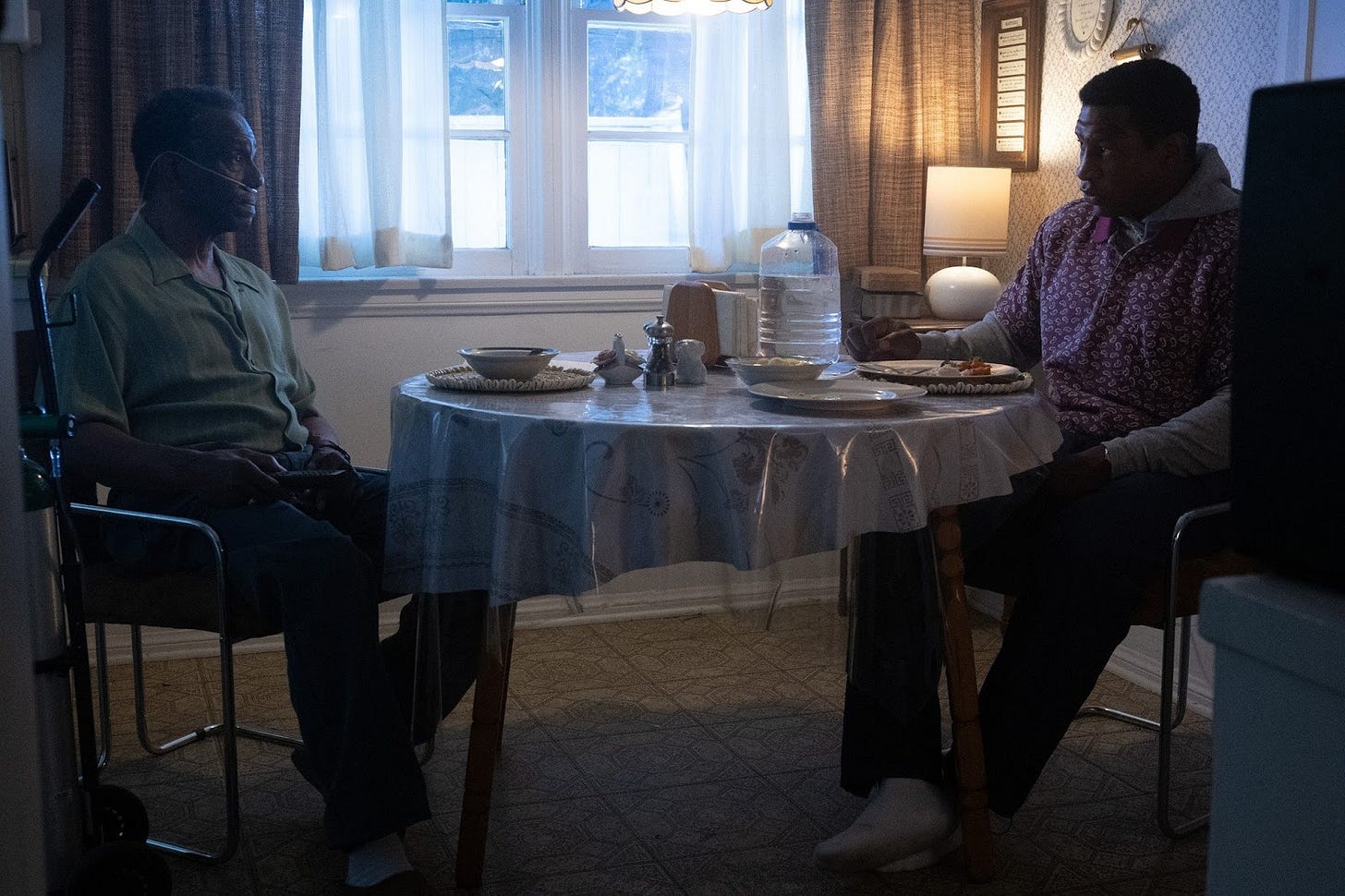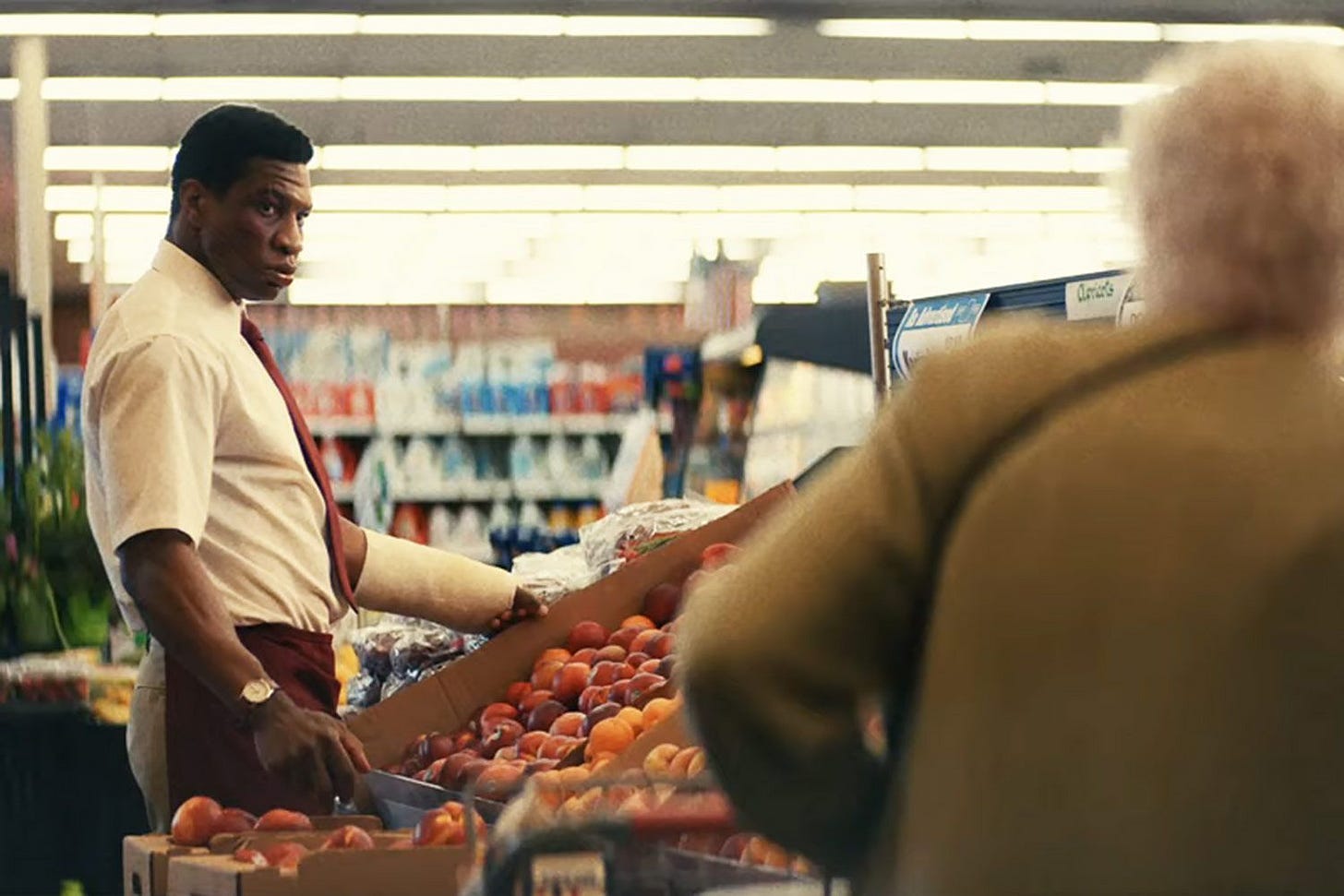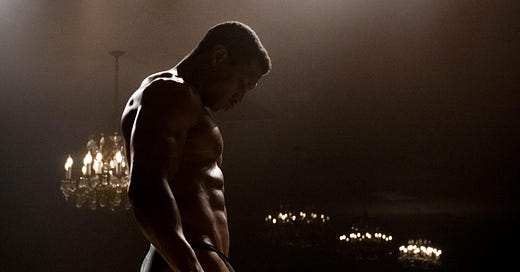The Storytelling of Magazine Dreams
Part II of a two part feature on the movie that challenged me as an artist.
It seems odd for me to be profiling a movie that only made $700,000 on its opening weekend (and cost $7-8 million to make, depending on who you ask). And it seems even more strange for me to be focusing on one movie outside of a wine and movie pairing.
Here’s the tea: I’ve been waiting to see this movie since it premiered at Sundance 2023. I never thought it would get released after Searchlight quietly dropped the rights to the movie early last year. And now that I have seen it, I got the staff at my local movie theater excited about seeing it, and I have not stopped thinking or talking about the movie since. There’s so much to say about Magazine Dreams (2023), the circumstances of its release, and why it is a critical watch right now that it demands a feature-length article, split into two parts.
Here’s Part I of this two-part feature, focused on the behind the scenes actions that got Magazine Dreams from page to screen through rewrites, distribution delays, and a whole lot of pumping iron.
Below is the second part of this feature, which focuses more on the movie and its themes, and how the backstory behind the making of Magazine Dreams makes it a must watch.
Please note: there are some delicate subjects in the movie that I feel are worth discussing within context. This is a trigger warning for those who are sensitive to content regarding body dysmorphia, drug use, eating disorders, and violence.
CHAPTER II: THE MOVIE
“I am invisible, understand, simply because people refuse to see me.” (Ralph Ellison)
Magazine Dreams (2023) opens with a flash of light, an empty stage, and a focus on the sinewy muscles of a statuesque bodybuilder. The camera’s favorite subject cycles through a series of poses, each one displaying a new, well-defined muscle, as the bodybuilder basks in the warm glow of the stage lights.
He stands on the stage alone, though a crowd can be heard roaring in approval with each new sweeping motion that reveals a new muscle group. Suddenly, our bodybuilder is pictured in gold posing briefs (swapped out for his original black ones), confetti is raining down from the sky, and Mr. Bodybuilder is flexing his stacked biceps and grinning from ear to ear as the neon title card takes over the screen.
Killian Maddox (Jonathan Majors) wants nothing more than to embody the pro bodybuilding champions he has come to idolize. After seeing him feature prominently in his own dream sequence, Killian is swiftly brought back to reality in the cold, harsh daylight of a social worker’s office. A state counselor (Harriet Sansom Harris) looks with kind eyes on a hunched over, reluctant version of Killian that almost apologizes for taking up space in her office and thoughts - the insecure Dr. Jekyll responsible for the actions of the glamorous Mr. Hyde from the previous bodybuilding montage.
As the counselor continues her conversation with Killian, some key details are revealed. The state has appointed her to check in with Killian regarding his capacity to care for his grandfather. Killian is susceptible to violent fits. During his recent hospital stay, he was overheard threatening nurses that he would “split their skulls apart and drink their brains like soup”. Killian suffers from migraines, nightmares, and lingering memories of his late parents, whom we learn were the victims of something traumatic (keeping this section spoiler free for now, but there will be a spoiler-filled update below a certain line).
And yet, the only thing that Killian wants to talk about with the counselor? The fact that he lives in a food desert. With the closest grocery store more than six miles away, and only junk food easily accessible, Killian is convinced that “they” are trying to kill people. There’s a pregnant pause, a warm but worried expression on the counselor’s face, and a kind of unspoken understanding that the counselor is unable to turn Killian’s attention away from his pursuit of bodybuilding perfection.
As more of the movie unfurls, the audience is immersed in a character study of a deeply troubled man with an unnerving drive towards achieving his life goal. Killian handles his grandfather - a Vietnam War veteran in ailing health - with tenderness and compassion. The two of them eat dinner together as the news talks of another Black man arrested in the neighborhood. Grandpap occasionally spoons a bit of light soup into his mouth, while Killian consumes a dozen hard boiled eggs, unseasoned broccoli, and lean chicken breast with the clinical efficiency of a machine.

Killian puts Grandpap to bed, then retreats to his bedroom - covered wall to wall with rippling physiques, magazine cutouts of Mr. Olympia winners, posters of IFBB Pros, and close-up shots of massive deltoids. The blue glow of a laptop illuminates Killian’s face. He sips a protein shake as he vacillates between watching video from old Mr. Olympia competitions and hardcore porn, his face expressionless as he studies both forms of entertainment, searching for a new insight that will make him a better bodybuilder, if not more a more perfect human.
We see a syringe emerge from a child’s lunchbox and plunge into Killian’s muscular backside. A workout in a quiet, dark gym in the early hours of the morning. The blue light of pre-dawn sun catching a fluorescent bulb bathes Killian in his own sweat and struggle. He stumbles through a self-tape where he introduces himself as “future IFBB Pro Champion”, then collapses clutching his heart. Wash, rinse, repeat. As Killian fills his days with workouts, protein shakes, porn, and syringes, his voiceover reads a letter to his ultimate hero: Brad Vanderhorn, the “perfect physique” that Killian has been struggling to emulate. Audiences learn that Killian has written nearly daily letters to Brad narrating his training and his personal struggles, all without response.
Killian is put through his paces at a competition. A wide shot reveals six bulky men preening and flexing almost simultaneously as judges call out poses. “Side chest. Relax. Back lat spread. Back double bicep. Relax.” The bodybuilders, each one more muscular and tanned than the last, elbow each other on the stage barely big enough to accommodate the width of six burly chests. And yet, Killian can be spotted from a mile away, cycling through his poses with fluid tension and audible grunts at center stage, as if every breath is an opportunity to capture the judges’ attention.
“21 and 7, switch.”

Killian locks eyes with the guy who was second on the left in the six man lineup. A visible shift in the force. As Killian’s intensity starts to bubble over, he shoots daggers at the new center stage competitor and the two switch places. It’s now apparent that the grunting and the extra showy transition from pose to pose is a defense mechanism - even with all of Killian’s size, he is nowhere near as big as the men with whom he shares a stage. All the protein shakes in the world can’t help him as he loses focus and shoves his own elbows in front of the bodybuilders to his right and left. The scene cuts, but not without a lingering sense of foreboding from the audience that Killian is both his only advocate and the biggest obstacle to his own success.
What follows shifts the tone of the movie from cautious optimism for an unsung and misunderstood hero to a cautionary tale of obsession, ambition, and the acknowledgment of society’s labels for other humans.
Spoilers below this line! If you haven’t seen the movie yet, go to your local movie theater, grab some popcorn (and maybe something comforting) and go see Magazine Dreams.
After the competition is where Killian truly starts to unravel. His dreams of a centerfold spread in fitness magazines slowly start slipping from ultimate life goal to distant memory. Killian’s anger bubbles over as he calls a painter to get another coat of paint done on the house. When the painter refuses (without extra compensation), there’s a moment of choice where Killian shifts his eyes, recalling what the state counselor told him about potentially losing care of his grandpap. But then Killian’s anger makes a choice for him. As if Mr. Hyde had instantly body snatched Dr. Jekyll, Killian threatens to come down to the painting store, find the clerks, and “split their skulls apart and drink their brains like soup”.
Threats are acted on, Pantera blares from a beat-up car, and Killian awakens in a hospital bed with a doctor prepping him for surgery and inquiring about steroid usage. Another moment of choice as Killian’s bodybuilding career flashes before his eyes. Killian declines surgery, claiming that “bodybuilders can’t have scars”. He disconnects himself from an IV, stumbles home with a massive cuts and bruises all over his body, and finds himself trying to explain his situation on a date with the checkout girl he’s been chatting up at the grocery store where he works (Haley Bennett).
(The first date scene is the reason why I firmly believe that Magazine Dreams is a food movie. Food is as much a character in the movie as any of the ensemble players - present on screen as a reflection of Killian’s mental state and other obstacles, if not his actual dreams.)

As Jessie (Haley Bennett) joins Killian for dinner at an informal steakhouse, she sees an endearing character with an ill-fitting polyester suit, a cut on his forehead that has started to bleed through its bandage, and a goofy, heart-melting grin. The two of them sit for dinner. She confesses that she told her dad about her excitement for the date. He bluntly confesses that both of his parents are dead, and his police officer father killed his mother in a murder-suicide incident not long ago.
A server appears right on cue in an attempt to break the look of horror on Jessie’s face. Killian orders a sirloin steak with no butter, a cedar grilled chicken salad with no tortilla strips or cheese, salmon without the sugar glaze, a Diet Coke, and a side of plain chicken breast. Jessie stammers before the words “shrimp salad” tumble out of her mouth without further comment.
Killian waxes poetic about the bodybuilding heroes whose pictures he has accumulated on his walls, lost in rhapsodic thought and disbelief that Jessie hasn’t heard of anybody he’s name dropped. Killian reveals that he finished sixth in his recent competition. Jessie grows noticeably more uncomfortable, then gets up to use the bathroom.
Cut to the next scene: Killian is surrounded by flavorless protein as the server comes over to inform him that his date had a “family emergency” and left the building 20 minutes ago. After a heavy sigh, Killian forces a grin for his own self-preservation as he orders “a few more food items”. The next scene depicts a table swimming with full racks of ribs, chicken alfredo pasta, a burger dripping with ketchup and cheese, at least two brownie ice cream sundaes… nearly 10,000 calories of eating his feelings. Killian shovels food in his mouth with renewed enthusiasm, then proceeds to purge it in the next scene.
A sense of commitment to the dream, even through the worst possible mental conditions.

Competition day. The big qualifying that could grant Killian his pro card. Killian says goodbye to his grandpap, proceeds to get in his car, emotional support water gallon riding shotgun. Suddenly, a painter’s van drives across the shot, a door opens, and an angry voice asks if Killian Maddox is home. Without thinking twice, Killian responds in the affirmative, then finds himself tossed out of the car, beaten with a metal pipe across the hood of his car, kicked on the ground, and spit on before the van tires squeal away.
Killian, bloodied and beaten, crawls into the front seat of his car, struggling through vertigo as he parks next to the back door of a theater. He maniacally hobbles through a backstage maze, following the austere overhead lighting through two check-in tables, ripping off clothes and stealing a quick spray of tanner from an unsuspecting competitor as he responds to three people calling for Killian Maddox to report to the stage. Finally, Killian arrives to center stage, in the same black posing briefs as the opening shot, but this time accessorized with a swollen eye, white crew socks still bunched around his ankles, and a toothy, insincere smile that would make Heath Ledger proud. Without prompts from the judges, Killian starts his routine - the same practiced poses from the home videos, the same grunts from the previous competition, but the stakes are dialed to 11. Killian strains to flex his broken muscles, struggles to take a deep breath through ribs that are likely cracked, and as one single vein on his neck starts to look for its own lighting… Killian passes out center stage. A fallen giant.
Arthur Fleck has just become The Joker. And more than that, both his demons and his dreams have simultaneously humbled him.
The rest of the screenplay goes down some dark and disturbing wormholes, and I would really like to keep as much of this analysis as spoiler free as possible to give people a chance to see the movie. But needless to say, the movie is a flawed but brilliant warning about the one-track minds of the obsessed, and what a person will do in order to achieve their goals.

Jonathan Majors delivers the performance of a lifetime. As Killian Maddox, Majors uses every inch of his body to tell the story when words fail. If the first few scenes reveal a Jekyll and Hyde persona consumed by poor mental health and a larger-than-life ego, Majors humanizes Killian by keeping him curious, searching for answers like a teenager learning to adapt to a world that doesn’t understand what drives him. There is a moment in the movie where Majors, as Killian, chooses to play into people’s perception of him, to catastrophic results that are undeniably fascinating to watch. It’s a breathless performance that only someone who fully understands how shapes shift on screen and words are only half a character’s lines could deliver. Magazine Dreams reminds audiences that Majors is still a movie star with undeniable range, fearless and fierce commitment to his projects like the best method actors of yore, and a fresh combination of brains and brawn practically tailor made for cinema.
Elijah Bynum’s script is pointed, with layers and layers of thematic writing regarding American obsession with antiheroes and obsession itself. Killian Maddox is written into just about every scene, and by focusing on Killian’s actions and reactions throughout the movie (he is in almost every shot, too), Bynum really drives home the character’s isolation. In my opinion, Magazine Dreams is a gorgeously shot movie that encapsulates all the beauty and the bloodshed of the bodybuilding sport in a dark, cinematic frame. Blue lights and red lights fight for attention as Killian illuminates the two personalities within him. The score, with its stirring chamber strings and invocation of Samson et Dalila’s famous seduction aria at exactly the right moment, lift its protagonist into a mental pantheon (and ruin) of his own making.
The third act is the weakest structurally, but by the time the plot points wrap up, audiences are enraptured by the rise and fall of a character so horrifically fascinating that the early focus on Killian is parlayed into a focus on Majors’ acting work. And while the script and direction truly showcase everything Jonathan Majors can do as a film actor, he is surrounded by an ensemble that knows their part to play - Harriet Sansom Harris (Frasier, Licorice Pizza) as the warm, compassionate, and nameless state counselor, Haley Bennett (Cyrano, The Widow Clicquot) as the bubbly checkout girl Jessie, and a scene stealing performance from Taylour Paige (Zola, Ma Rainey’s Black Bottom) that transcends her anonymous character, dubbed Pink Coat by IMDB.
I was a Jonathan Majors fan before hearing of Magazine Dreams (2023), and after two years of professional and personal delays, the movie is now being released to the world. The press around the movie has largely focused on the legal troubles of its star, but I find it much more fascinating that audiences have appeared to take the movie at face value. As of this publication date, Magazine Dreams has achieved an 80% Tomatometer critics score and a 90% Popcornmeter audience score on Rotten Tomatoes. One can hope that Majors, who has appeared repentant and grateful while doing publicity for the movie, is ready to literally put Killian Maddox to rest now that the movie is playing to the public instead of getting lost to film purgatory. Meanwhile, this unsettling mirror of a movie has spurred me to treat myself with kindness and seek out genuine connections with others while continuing to pursue my own dreams. I hope that you will find it as troubling, affecting, and eventually rewarding as I have.







